PRESENTATION ON BEHALF OF HAITH’S – “HEALTHY DIETS…HEALTHY BIRDS” by John E. Cooper and Andy Beer.

Haith’s (John E Haith Ltd) is based in Grimsby, North East Lincolnshire, England and has been producing quality bird food since 1937.
This presentation outlines the quality control (QC) programme that Haith’s introduced for its diets in 2012 and describes how subsequent collaboration with the Royal Zoological Society of Scotland (RZSS) has led to the addition of a schedule of nutritional analyses for its bird seeds and mixes.
The quality control (QC) programme for diets devised by Haith’s three years ago focuses primarily on safety, acceptability and palatability. It consists essentially of gross examination (including use of hand lens), microscopical investigation, stereo light and compound light microscopy and culture for bacteria and fungi. Initial in-house screening is carried out regularly by suitably trained staff at Haith’s Bird Food Centre, after which more detailed laboratory tests are performed by John E Cooper, Haith’s veterinary advisor. Particular attention is paid to the cleanliness of the products.
Dust is a dirty word at Haith’s because of the harm it can do to a bird’s respiratory system while extraneous husk can damage delicate tissues and facilitate the entry of pathogens, such as Candida. If not carefully sourced and formulated, seeds and fruits may harbour infectious agents, toxins or adulterants. Additional studies are in progress on the health of invertebrates, such as mealworms, that are used to feed birds and while a new area of research is throwing light on the durability and long-term nutritional value of suet-based diets.
In June 2013, at the BIAZA meeting in Plymouth, Haith’s staff met Andy Beer and in November 2013, a small delegation from Haith’s travelled to Edinburgh and talked to RZSS staff. The outcome of the meeting was a collaborative arrangement whereby nutritional analysis of Haith’s bird seeds and mixes is carried out using near infrared spectroscopy (NIRS), thus providing important information and understanding of their composition and contribution to nutrient intake.
RZSS & Haith’s will continue their collaboration and, together with expansion of Haith’s existing QC programme, seek to develop and refine specialist combinations of seed to maximise the nutritional benefits for species of endangered and threatened birds in zoos and conservation breeding programmes. As Haith’s emphasises in its literature and lectures, “healthy diets…healthy birds”.
Professor John E. Cooper and Andy Beer (RZSS Nutritionist)
Slides used at the prestigious BIAZA AGM and Conference by Haith's PRO:
Thank you.This presentation is on behalf of Haith's, the bird food company. It will be given by myself (Professor John E. Cooper) and Andy Beer, RZSS Nutritionist. Many of you will be familiar with Haith's and their reputation.
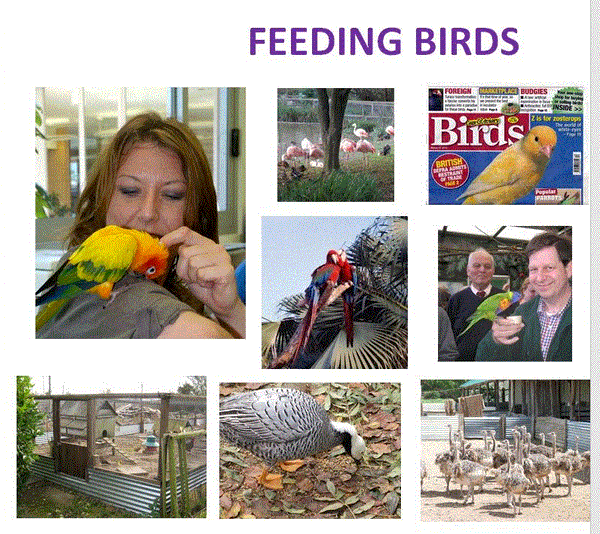
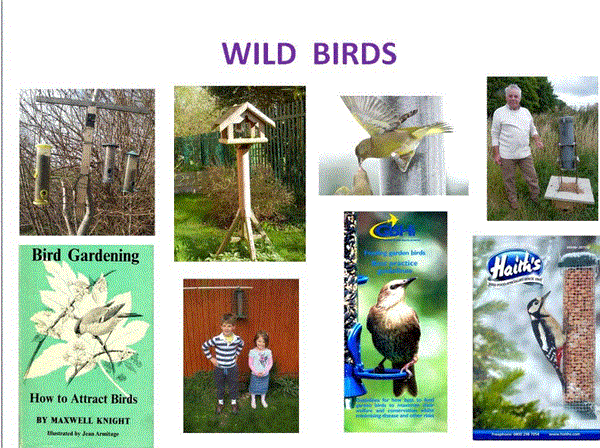
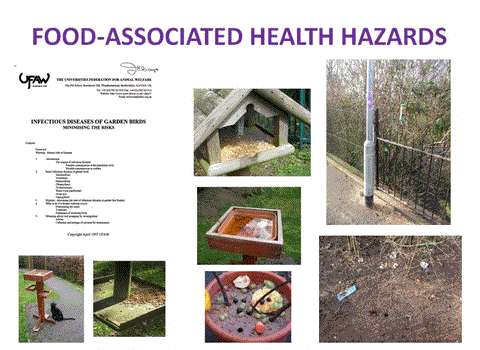
But diets can present hazards - and bird diets are no exception. Particulalry well-documented are diseases, some transmissable to humans, in garden birds. But similar threats face birds in captivity, especially if hygiene is inadequate and wild rodents are present.
Where do bird diets come from? Lots of places! Compounders and suppliers, such as Haith's, supermarkets, pet shops - and even King's Lynn market, where Margaret (my wife) and I live. Some of these bags had been offered on sale, in the sun, for over a week.
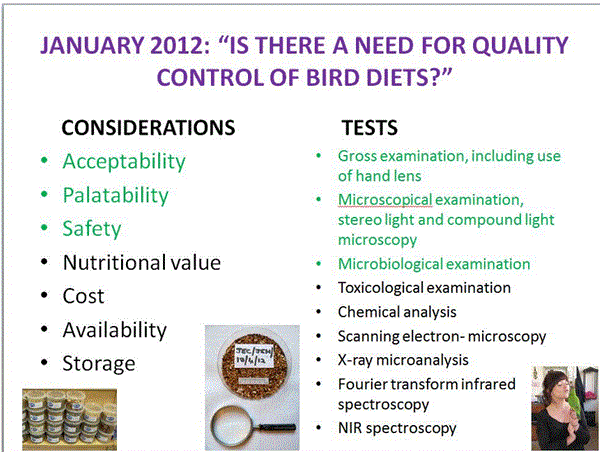
The first stage was to involve Haith's staff at their Bird Food Centre in Grimsby. We organised training workshops and over the past year staff have carried out simple tests, including some microscopy, as part of the initial screen.
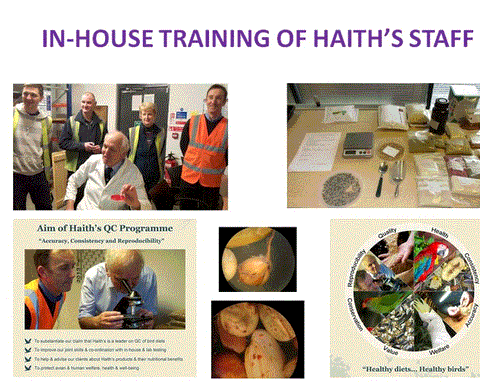
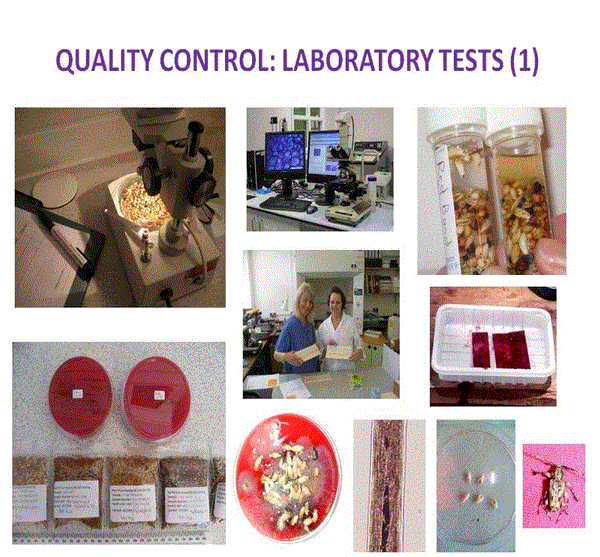
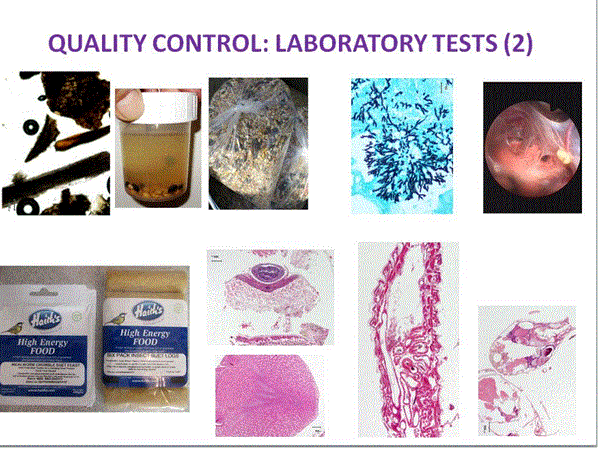
A new chapter - Andy Beer - RZSS Nutritionist
A link up between two British organisations, a conservation charity and a bird food specialist, has led to a pioneering development that will help change the way birds are fed in the UK.
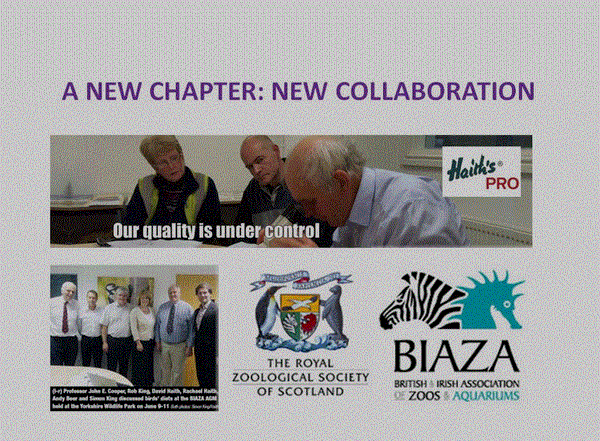
Previously not listed on packs, the project will eventually enable the correct identification of the fibre, protein and mineral level compositions of bird food. This unique alliance between the Royal Zoological Society of Scotland (RZSS) and Haith's has seen a joint investment in a collaborative research programme that shares collective knowledge and uses science to accurately unlock the secrets of seed based avian diets. The first results of the collaboration were formally launched at the British and Irish Association of Zoos and Aquariums (BIAZA) AGM at Yorkshire Wildlife Park on Wednesday 12 June.
Plymouth - Andy Beer.
As well as allowing domestic bird owners to make more confident and informed choices, the results will now lead to a zoo nutrition database for birds that will help construct diets with even better levels of nutrition. It is also hoped the knowledge will reduce the cost of mixes - helpful for zoo and aviary budgets. This is the very first time this has been done in the UK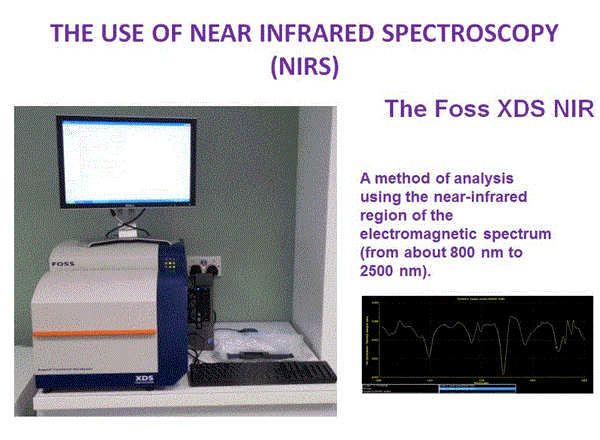 Use of NIRS - Andy Beer.
Use of NIRS - Andy Beer.
"Using Near Infra-Red Spectroscopy (NIRS) analysis laboratory analysis of the indicative composition of bird seed that Haith's sell has been determined. Potentially, this will enable the Company to provide accurate information on the label over time. Currently manufacturers have relied on spot checks and one off analysis. This knowledge will be used to further improve our range of SuperClean™ avian zoo diets, under the watchful eye of Professor John E Cooper FRCVS, FRCPath, our longstanding adviser.
The results of this project will help understanding of improved avian nutrition. It was one of those moments, when you think "that's good!" we can make a real difference and create something significant to help zoo collections. Edinburgh Zoo's bird collection will benefit because there is limited knowledge of the precise nutritional value of the individual components of blended seed diets and predicting nutrient intake accurately remains elusive for such diets. Haith's will also use the information to benefit wild (free-living) birds."
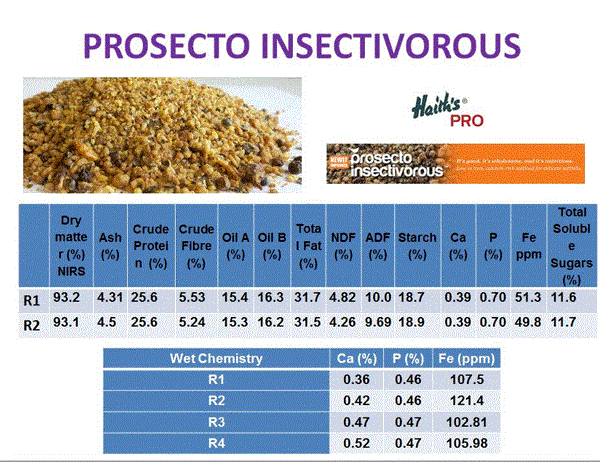
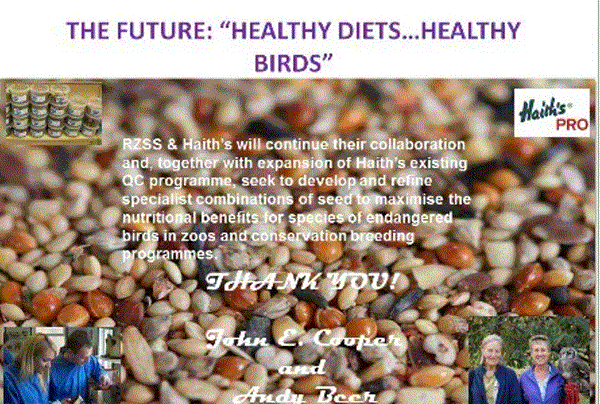
Professor John E. Cooper and Andy Beer.
……………………………………………………………………………………………….
PROFESSOR JOHN E COOPER, DTVM, FRCPath, FSB, CBiol, FRCVS, Diplomate, European College of Veterinary Pathologists, European Veterinary Specialist, Zoological Medicine, RCVS Specialist in Veterinary Pathology
John Cooper is a member of a husband and wife team. John qualified originally as a veterinary surgeon and is now a specialist pathologist with particular involvement in wildlife and exotic species, tropical diseases and comparative medicine. His wife, Margaret E Cooper, is a lawyer who trained as a British solicitor and has made the study of animal and conservation law her special interest.
The Coopers have travelled widely and lectured together in many countries. They have spent nearly twenty years living overseas, especially in Africa, including a period in Rwanda working with the mountain gorillas. In 2009 they returned from nearly seven years at the University of the West Indies in Trinidad and Tobago where they combined their medical and legal backgrounds in the promotion of an interdisciplinary approach to veterinary and biological education, wildlife conservation and forensic science. They are the authors of various books and many scientific and popular articles. John and Margaret are now based in Britain but they continue their voluntary work with wildlife, domesticated animals and rural communities in East Africa.
Written by Professor Cooper


